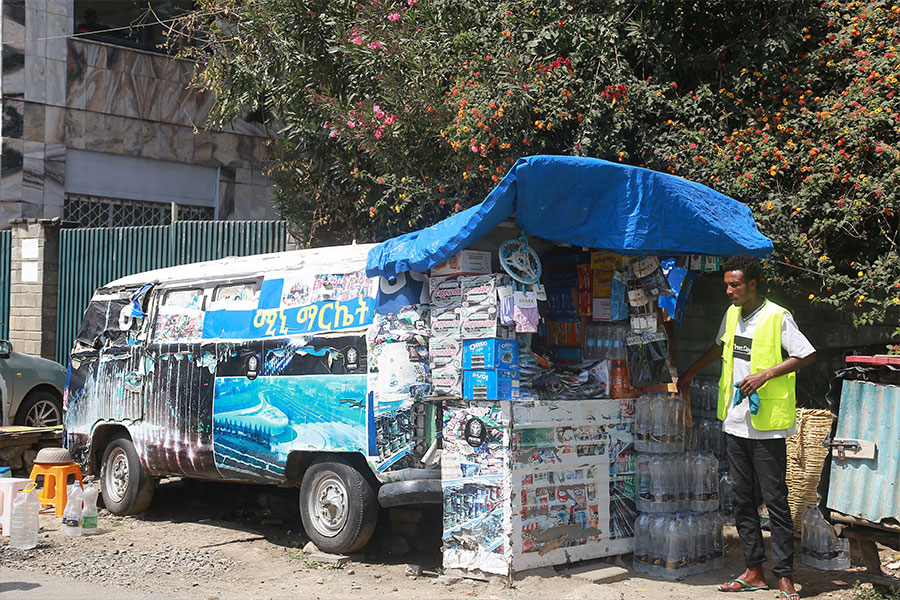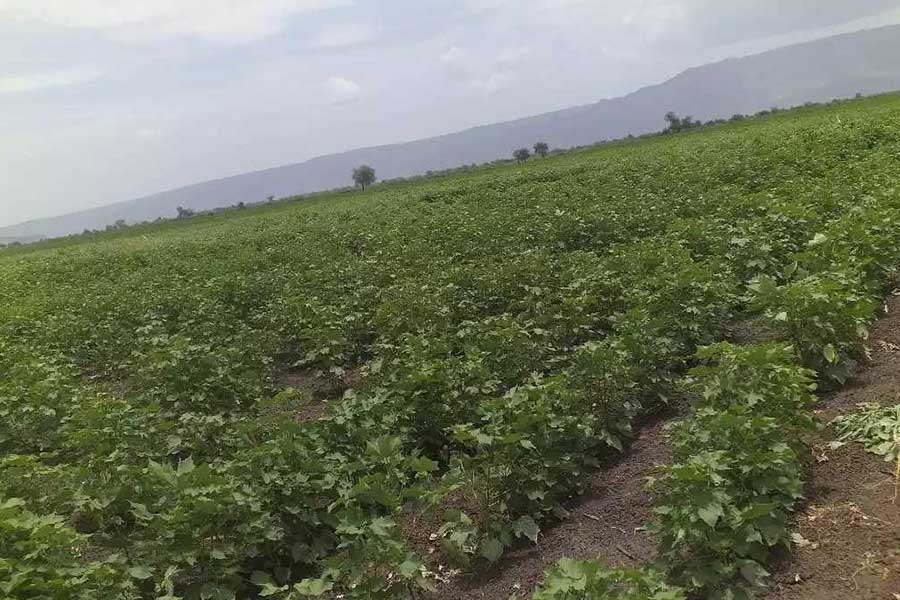
Radar | Feb 25,2023
The federal government is to introduce an arrangement that would allow investors and smallholder farmers to engage in commercial farming under joint venture agreements.
The arrangement comes following a study conducted by Panacea Management & Development Consultancy Plc, a firm incorporated in 2012, on the status of commercial farming in four regional states. Financed by the German Agency for International Cooperation (GIZ), the study reveals relationships between investors and rural landholders remain largely "unhealthy". The findings were submitted to the Ministry of Agriculture last December.
“This is one factor that undermines commercial farming's contribution to the economy,” said Alemayehu Gebreselassie, director of commercial investment at the Ministry.
Ethiopia’s commercial farming dates back to the 1960s when large farms were opened in Hawassa, Arba Minch, Ziway (Batu) and Shewa Robit. The expansion of private commercial farms was curtailed in the aftermath of the 1974 revolution, replaced by state farms in the subsequent decade.
Commercial farms account for only five percent of agricultural output. Last year saw 87.4 million quintals of crops harvested from 1.1 million hectares cultivated by commercial farmers, according to a survey published by the Ethiopian Statistics Service. Grains comprise nearly 90pc, while close to half of all commercial farming activities were undertaken in the Amhara and Oromia regional states.
Despite the economic potential of commercial farming, land allocations have been detrimental consequences to rural landholders, thereby impeding progress. The study conducted by Panacea highlights that inappropriate large-scale land allocation has led people to lose access to the natural and ecological resources on which their livelihoods depend. The procedures have also resulted in widespread displacement without adequate consultations, with farmers losing their land or compensation to support their livelihood.
Experts at the Ministry use the new study to develop a guideline, ensuring rural landholders' rights for consent before allocating to investors. The guideline encourages smallholder farmers to engage in joint ventures with investors in commercial farming.
“It'll have the force of a directive to make it mandatory,” Alemayehu told Fortune.
Ministry officials await the approval of a bill that legislates cluster farming before introducing the directive, as the latter is expected to include provisions related to cluster farming, according to the Director. They hope to win Parliament's vote to enact the draft proclamation on cluster farming before the end of the budget year in July.
Land belongs to regional states under Ethiopia's constitution. However, the federal government has been allocating land - on the states' behest - to investors since 2009, using legislation that places plots over 5,000hct under its oversight. The Ethiopian Agricultural Investment Land Administration Agency (EAILAA) was established a year later to facilitate the transfer of farmland.
Adane Tuffa (PhD) is an economist who is also a member of the Agricultural Economics Society of Ethiopia. He observed that giving the federal government authority over land under the purview of regional administrations is one of the significant contributors to the unhealthy relationship between investors and farmers.
Players in the commercial agriculture scene say the flaw is partly responsible for the failure of foreign investors such as the Indian Karaturi Agro Products Plc. The infamous venture began in 2011 to farm export-standard wheat. The company was granted 11,000hct land near the town of Bako, part of a former state farm near the Oromia Regional State; and 100,000hct in the Gambella Regional State but only developed 7,645hct before the venture collapsed in 2015.
Gambella was one of five regional states selected for the expansion of commercial farming on nearly 3.5 million hectares of land. Benishangul-Gumuz was also on the list; together, the two regional states accounted for eight percent of land granted to commercial farming developers.
Musa Dawid, team leader at the Benishangul-Gumuz Investment Bureau, says most of the land allocation before 2018 has had considerable impacts on locals due to ecological disruptions.
“Investors focus more on clearing forests rather than giving due attention to forest and water resources, wild animals and the natural habitats," he said.
In recent years, federal authorities moved to reshape commercial farming. They began by transferring some of the Agency's mandates to the Agriculture Ministry. An Agricultural Investment Directorate under the Ministry is tasked with monitoring large-scale agricultural investments, while regional state administrations reclaimed their constitutional prerogatives to facilitate the transfer of all farmland.
Yet, there is no guideline or code of conduct establishing the rules developers are required to comply with. No office has been established to monitor their activities against rules and regulations.
It is a gap observed by Mustafa Muhammed, a developer who leased 255hct in the Asosa Zone of Benishangul-Gumuz six years ago. The plot is part of the 350,000hct leased out to 950 developers in the regional state. Mustafa says he could not grow crops on more than half of the land due to a shortage of inputs and workforce.
"I can't even get daily labourers to develop my land," he toldFortune. "The local population resents investors like me."
Mustafa struggled to repay 10 million Br in loans taken from the state-owned Development Bank of Ethiopia (DBE) five years ago.
The total land leased to commercial farming doubled to 2.43 million hectares in the six years beginning in 2010. However, an investigation commissioned by the Prime Minister's Office in 2016 revealed that the loans poured into commercial farms in the Gambella and Benishangul-Gumuz regional states have had disappointing returns, representing a fraction of the initial investments. Less than a quarter of the land leased to developers in Benishangul-Gumuz has been developed thus far.
The report, which puts commercial farm productivity at 6.6pc, came after allegations of misappropriation of loans, favouritism and impropriety on the part of recipients. Much of the allegations were about the misuse of over 3.3 billion Br in loans advanced by the DBE and the Commercial Bank of Ethiopia (CBE). The latter financed 206 of the 600 developers in Gambella before the federal government suspended loans to commercial farming.
Developers were advanced close to five billion Birr in credit, with the DBE providing over half the total.
There were 5,680 local and foreign developers of commercial farming before the loans were suspended in 2016. However, many abandoned their ventures following the loan freeze, shrinking the area developers farmed by almost half.
PUBLISHED ON
[ VOL
, NO
]

Radar | Feb 25,2023

Featured | Oct 11,2020

Fortune News | Nov 17, 2024

Radar | Apr 19,2025

Fortune News | Jun 24,2023

Viewpoints | Sep 21,2024

Agenda | Aug 31,2019

Fortune News | Jun 04,2022

Fortune News | May 18,2019

Fortune News | Oct 03,2020

Dec 22 , 2024 . By TIZITA SHEWAFERAW
Charged with transforming colossal state-owned enterprises into modern and competitiv...

Aug 18 , 2024 . By AKSAH ITALO
Although predictable Yonas Zerihun's job in the ride-hailing service is not immune to...

Jul 28 , 2024 . By TIZITA SHEWAFERAW
Unhabitual, perhaps too many, Samuel Gebreyohannes, 38, used to occasionally enjoy a couple of beers at breakfast. However, he recently swit...

Jul 13 , 2024 . By AKSAH ITALO
Investors who rely on tractors, trucks, and field vehicles for commuting, transporting commodities, and f...

Nov 1 , 2025
The National Bank of Ethiopia (NBE) issued a statement two weeks ago that appeared to...

Oct 25 , 2025
The regulatory machinery is on overdrive. In only two years, no fewer than 35 new pro...

Oct 18 , 2025
The political establishment, notably the ruling party and its top brass, has become p...

Oct 11 , 2025
Ladislas Farago, a roving Associated Press (AP) correspondent, arrived in Ethiopia in...